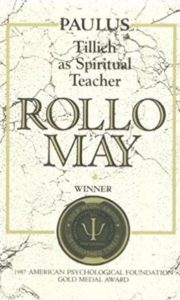 This short book is one of my favorites of Rollo May. It’s only a little over 100 page, has been out of print for a while (though still fairly easily accessible), and is not your typical Rollo May book. However, it did win the 1987 American Psychological Foundation Gold Metal Award.
This short book is one of my favorites of Rollo May. It’s only a little over 100 page, has been out of print for a while (though still fairly easily accessible), and is not your typical Rollo May book. However, it did win the 1987 American Psychological Foundation Gold Metal Award.
The book is a tribute to May’s mentor and friend, Paul Tillich. Tillich, one of the most famous American theologians, spent many years teaching philosophy and theology at Union Theological Seminary. His work has not only be influential on theology and philosophy, but he has also been a powerful influence on existential psychology. His most famous work in psychological circles is The Courage to Be.
May compassionately gives the story of Tillich’s life and thought in a way which applies to psychological theory. Tillich is presented in a very human manner in this book. His mistakes, including his affairs, are not hidden from the reader. Rather, Tillich is presented as who is very human yet able to make profound contributions to the world of thought.
One of the greatest contributions of Tillich’s thought which May addresses is the benefits and agony of doubt. Tillich saw doubt as contrary to faith, but rather as part of it. This also forms the basis for one of Tillich’s greatest quotes: “Sometimes I think it is my mission to bring faith to the faithless, and doubt to the faithful” (p. 71). This statement is one that has become my teaching philosophy. I believe it can be applied well beyond the the topic of faith in God, to many other realms of thought.
Another important contribution in this book is May’s discussion of Tillich’s presence. This is the basis for the title being referred to as “Paulus,” which brings a much more intimate feel with it. May goes through extensive detail about his perception of Paulus’ presence. This has been the basis for much of my own though development around the issue of presence — both in examining my own presence and also in using this as a teaching technique for those studying to be therapists.
Overall, this is an excellent, excellent book which I highly recommend to therapists, theologians, and anyone interested in existential theory.
Added 2004; Never been updated
